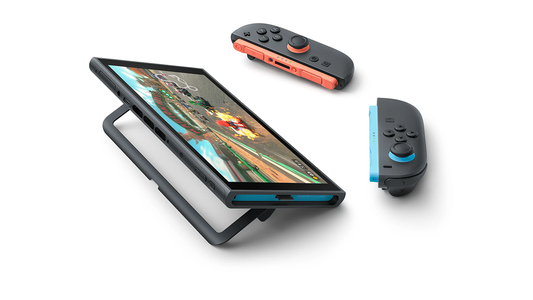When Jonathan Blow released Braid, its critical and commercial success helped to spark the burgeoning indie game scene. Since then, Blow has sunk seven years of his life—and millions of dollars—into designing his next release. “I have spent all the Braid money,” he says. “That’s all gone.”
The Witness, out January 26, is an open-world puzzler set on a colorful island riddled with mazes, each more complicated than the last. But that description doesn’t capture the game’s ambition. “Everything in western culture is pretending to be about what it’s about, just echoing a theme,” Blow says. “The Witness is a game about trying to understand the world and see it clearly. It’s about being a human, and wondering what that means.”
Blow rejects many of the standard tropes of puzzle games. There are no overt instructions—players are left to fend for themselves. And there are no arbitrarily hidden keys that you need to find in order to unlock doors that block your path. “All you ever need in order to open the door is the right idea,” Blow says. “The deeper you go, the more you understand about the meaning of the game.”
We spoke to Blow about his design process, the state of indie games, what it’s like to spend all your cash in pursuit of the perfect game, and why he hopes you won’t simply watch other people play through The Witness on Twitch
What would you say are the main differences between The Witness and Braid?
"The game is designed to create many opportunities for epiphany moments, both small and large. You know that it’s not just about the solving of problems, but what happens when you do."
The Witness is way, way bigger, and I think of it as a more mature designer’s game. It takes some of the ideas you see in Braid and explores them more thoroughly. Braid is set up with a specific number of puzzles and every one had a specific point. In The Witness, that is true as well, but there are so many more puzzles that the idea becomes about stream of communication and relatedness.
What are you hoping people will get out of it?
The most direct answer to that is a massive spoiler. There’s a strong thematic element in it about being a human in the world and wondering what that means. What should we be doing, and how should we see the world, and what is an accurate way to see the world, and what is a fantastical way of seeing the world? The gameplay experience echoes that theme to the greatest extent possible.
No instructions are given you when you start. You are fending for yourself and taking a great deal of initiative to solve problems. You know that it’s not just the solving the problems but what happens when you do. The game is designed to create many opportunities for epiphany moments, both small and large.

Some puzzle designers like to design for “aha” moments where the player gets stuck, then they figure it out, and then the player feels really smart. That irritates me.
"Early in development, the idea was to make the story very explicit and straightforward, with audio logs. But the more ways I tried that, the more I didn't like it."
Part of the idea behind The Witness is that puzzles are not arbitrary. There are real ideas behind every single one. When you figure out the puzzle, you clearly see some relationship that happens in reality, or space, or time, or something like that. And you see very clearly how that relates to the current situation. It’s not an arbitrary “aha” that makes the player feel smart: The player really understands this thing, and they are smart. I’m not tricking you into feeling smart, you are getting to exercise your natural intelligence.
Is there a narrative built into the game?
Yes, there’s a definite story. And early on in development, the idea was to make that very explicit and straightforward, with audio logs where the story plays out in recordings the way a lot of games do.
But the more ways I tried that, the more I didn't like it. What happens now is the story is really subtle, but the more you explore the more clues you can find to what’s going on. The people who really thoroughly solve the game will see the most concrete things. There’s a great opportunity for discovery of backstory through exploration.

Would you say that Braid’s huge surprise success helped you make the game you wanted to make in The Witness?
Financially, for sure. Without the money from Braid, I wouldn’t have made it at all. I have spent all the Braid money, that’s all gone. So... hopefully some people will buy this new game. [laughs]
"I have spent all the Braid money, that’s all gone. So... hopefully some people will buy this game."
From just a creative standpoint, the ideas in The Witness do continue from Braid. I talked about having an idea behind each puzzle. There are different aspects of that. I don't want to cloud the idea by putting lots of things that obscure it in each level, I don't want to put red herrings. Things are more strong and resonant and beautiful when you just let them be there and don't hide them, which is cheap and cheesy.
When I started the game I thought of it as a descendant of graphic adventures, games like Myst or TV point-and-click adventures of the time, and all those games have a lot of problems. Part of what I was doing as designer was to sit down and think about how to make a game that has all the good parts of those games but is free of all those problems, like being confused by the interface and wondering if this thing in the environment is a thing I’m supposed to interact with.
The game became something that isn’t quite a graphic adventure anymore. But I also started to see ways that those could be done better. For example, a thing that happens in many kinds of games is there’s a locked door and you can’t get through it. You need a key to get through the door and usually you do some challenge to get the key and then come back. That’s a good structure and is understood: You see what you have to get past and then you find the thing and go through. It is a structure that helps player have goals. But traditionally, those games are very linear. It’s just sequence of events, so why dress this up as key for door when that’s all you’ll let me do anyway? I’m just going through this thing that the game is aiming me in this direction of. It might not be clear in my mind that I need to get the key for that door, I’m just doing what the game is suggesting.

No tags.





































